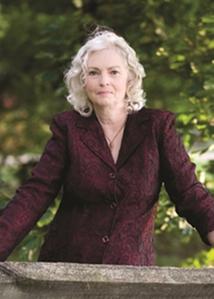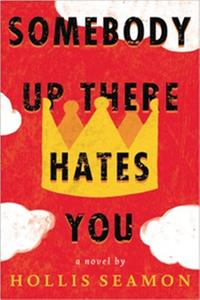
|
|
| photo: Teresa Rieder Photography | |
Hollis Seamon drew her inspiration for Somebody Up There Hates You (September 3, 2013) from the witty, courageous teens she met during visits she made with her son to Columbia-Presbyterian Medical Center (fondly known as "Babies"). The good news is that her son is now 40 years old and publishing a book of his own. With SUTHY, Seamon (Corporeality and Body Work) makes her YA debut.
Even though dying is a serious topic, Richard Casey is one very funny narrator.
I knew this book would succeed or fail on voice. Even people who loved the short story [in which Richie first appeared] said you can't write a whole novel about a kid in hospice. I wanted to take that as the challenge. I knew that it would have serious stuff going on, but I wanted it to be funny and a love story. The teens were funny in hospice, and they were very, very sick. I never thought it should be one or the other.
Is it sometimes easier to be emotionally truthful through fiction, rather than nonfiction?
Absolutely. I can't imagine the kind of exposure I would feel if this were a memoir. I tried to be fiercely protective of my son's privacy. If he wants to write about his experience, he can. Fiction allowed me to write about this, and still impart the base knowledge I gained. I only write fiction. I couldn't even keep a diary without lying.
 Cancer levels the playing field, doesn't it? Richie and Sylvie likely would not have crossed paths "on the outside."
Cancer levels the playing field, doesn't it? Richie and Sylvie likely would not have crossed paths "on the outside."
The hospital is its own world. When I was there with my son, I couldn't tell if a kid was from a poor home or a rich home. Everyone was treated exactly the same. They didn't talk much about their outside lives or school; they didn't have common acquaintances. You were born in this minute and you were going to live in this minute because there was no other context.
Do you think your experience as an adult writer helped you in regard to fleshing out the adult characters? Sylvie's father, for instance, is so real.
When I wrote this novel, I didn't have a clue it would be a young adult novel. I always knew that Sylvie's father would be in some ways the antagonist figure. He would be that way whether Sylvie was sick or not. He's a lawyer; he's used to having total control. There's nothing he can do. He's insane with helplessness and frustration. What these circumstances do is they make everyone be themselves but more so.
Why was the romance important to include?
I wanted Richie to have moments of intimacy, I wanted him to have a little bit of a love affair. I wanted him to feel like he can in some ways protect Sylvie, sacrifice for her. I wanted him to have not the full spectrum, but a range of experience, including a kind of heroism. He thinks he knows everything, and part of the growing-up process is his finding out that he doesn't. I've always thought of this as an extreme coming-of-age story. He's doing everything someone would do in their lifetime, and he's doing it in 10 days.

